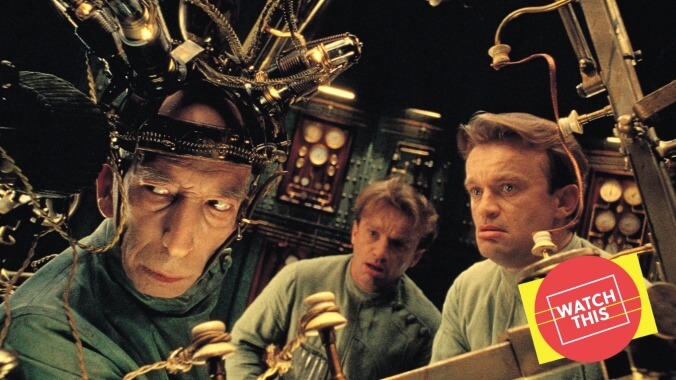In the '90s, the director of Amelie and the fourth Alien made a brilliant dystopian fantasy
Jean-Pierre Jeunet's steampunk cult classic The City Of Lost Children ditched noir's detectives but kept its world-weariness

Watch This offers movie recommendations inspired by new releases, premieres, current events, or occasionally just our inscrutable whims. This week: With the Hugh Jackman vehicle Reminiscence headed for theaters and streaming, we’re thinking back on other sci-fi noirs.
The City Of Lost Children (1995)
Because the most high-profile success of Jean-Pierre Jeunet’s career has shaken out to be 2001’s Amélie, many harbor a lingering perception of the French director as a merchant of cozy whimsy and quirky romance. But that movie is basically an anomaly in his filmography, having scored a fistful of Oscar nominations and a head-spinning $174 million windfall specifically for how it eschewed many of the signature, alienating elements of his style. The usual grimy textures, immersive dark-fantasy environments, and jerry-rigged contraptions out of Terry Gilliam’s hazier nightmares all went on a temporary hiatus in Amélie, and yet Jeunet’s devious authorial touch shone through in the odd suicide jumper tumbling out of the sky. Though engaging with the rom-com made his work more accessible, he still filtered its markers through a morbidly antic sensibility unmistakable as his own.
Set in a fetid soundstage muck-land peopled by steampunk cyclopes and bumbling clones, The City Of Lost Children takes place closer to Jeunet and co-director Marc Caro’s natural habitat, even as it assumes the same playful, idiosyncratic approach to an unfamiliar genre. Sci-fi is the default mode for a fanciful yarn about a mad scientist (Daniel Emilfork) kidnapping street urchins to steal their dreams since he can’t generate any of his own, using a ghastly extraction device typical of the film’s clanking analog machinery. (What better way to retrieve a key on the other side of a door than with a rat tied to a magnet?) Within that framework, however, there’s room for adventure and slapstick comedy and a mystery borrowing judiciously from noir tradition, with tropes and themes reworked through Jeunet’s bug-eye-goggled vantage. No plaintive sax solos, no voiceover narration, just the bone-deep world-weariness from a wayward soul traversing a senseless, confusing underbelly.
In the place of a gumshoe, we have the carrot-topped carnival strongman One (a laconic Ron Perlman), caught up in all this when his adopted little brother (Joseph Lucien) gets snatched for the fiendish experiment. One and his moppet sidekick (Judith Vittet) track the boy through a plot so labyrinthine that Roger Ebert openly professed not to have followed it—a Hammettesque jumble of heel turns and Dadaist reversals of fortune involving an amnesiac diver, a significant scalp tattoo, hyperintelligent fleas, and a sentient brain in a jar named Uncle Irvin. The kindly One may not be all that hard-boiled, but he ably fills the role of the principled patsy drawn into a conflict vaster than he realizes, landing himself between the conjoined-twinned bosses of a junior crime syndicate (the women jointly referred to as “The Octopus”) and the lunatic thinning their roster.
Some moments, as in the scene when the action pauses so One can get soused at a dingy bar, wear this spirit of homage on their sleeve. More frequently and subtly, Jeunet articulates his take on noir through melancholic emotional currents in line with the lamentation for wasted life that originally defined the genre. His films teem with lost and lonely figures, surrounded by death and willing to take absurd measures to assuage that dread by connecting to someone else. For all the attention paid to the handsome surfaces—Jeunet and Caro’s technical expertise, Darius Khondji’s transportive cinematography, Jean-Paul Gaultier’s shabby-chic costuming, Angelo Badalamenti’s moaning string arrangements—the power behind this aesthetic wonder comes from its mournful edge, belied by the resourceful mischief. Clattering doodads clutter the screen, but it’s how they can be abused for avaricious, cruel purposes that makes this a Jeunet film—a genre unto itself.
Availability: The City Of Lost Children is currently streaming on Amazon Prime. It’s also available to rent or purchase digitally.